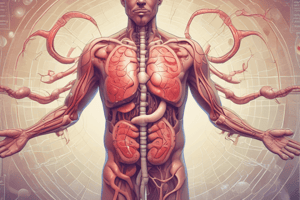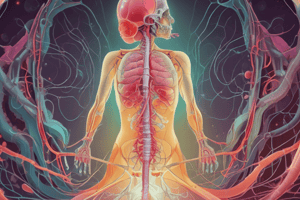Podcast
Questions and Answers
What is the primary function of the glomerulus?
What is the primary function of the glomerulus?
- To filter waste and excess substances from the blood (correct)
- To maintain acid-base balance
- To regulate electrolyte levels in the body
- To reabsorb essential substances into the bloodstream
What is one of the functions of the kidneys in maintaining overall body health?
What is one of the functions of the kidneys in maintaining overall body health?
- Regulating body temperature
- Stimulating muscle contractions
- Producing digestive enzymes
- Maintaining acid-base balance (correct)
Which hormone is involved in regulating kidney function?
Which hormone is involved in regulating kidney function?
- Insulin
- Aldosterone (correct)
- Thyroxine
- Adrenaline
What is the term for the kidneys' ability to regulate their own blood flow and filtration rate in response to changes in blood pressure?
What is the term for the kidneys' ability to regulate their own blood flow and filtration rate in response to changes in blood pressure?
What is a potential treatment for patients with end-stage renal disease?
What is a potential treatment for patients with end-stage renal disease?
What can occur as a result of impaired kidney function?
What can occur as a result of impaired kidney function?
Flashcards are hidden until you start studying
Study Notes
Kidney Function
Filtration and Reabsorption
- The kidneys filter waste and excess substances from the blood through a process called ultrafiltration
- The glomerulus (a cluster of capillaries) filters the blood, and the filtrate enters the Bowman's capsule
- The filtrate then passes through the renal tubules, where most of the water and essential substances are reabsorbed into the bloodstream
Functions of the Kidneys
- Waste removal: Kidneys remove waste products (urea, creatinine, etc.) from the blood and excrete them in the urine
- Regulation of electrolytes and water: Kidneys regulate the levels of electrolytes (Na+, K+, Ca2+, etc.) and water in the body
- Acid-base balance: Kidneys help maintain the body's acid-base balance by regulating the levels of hydrogen ions
- Hormone regulation: Kidneys produce hormones that regulate blood pressure, produce red blood cells, and maintain strong bones
- Blood pressure regulation: Kidneys help regulate blood pressure through the renin-angiotensin-aldosterone system
Regulation of Kidney Function
- Autoregulation: Kidneys can regulate their own blood flow and filtration rate in response to changes in blood pressure
- Nervous control: The kidneys are innervated by the sympathetic nervous system, which can increase or decrease blood flow to the kidneys
- Hormonal control: Hormones such as aldosterone, vasopressin, and atrial natriuretic peptide can regulate kidney function
Clinical Relevance
- Kidney disease: Impaired kidney function can lead to chronic kidney disease, acute kidney injury, or end-stage renal disease
- Dialysis: Artificial filtration of the blood can be used to replace kidney function in patients with end-stage renal disease
- Transplantation: Kidney transplantation can be used to restore kidney function in patients with end-stage renal disease
Studying That Suits You
Use AI to generate personalized quizzes and flashcards to suit your learning preferences.




